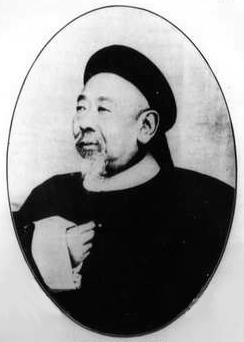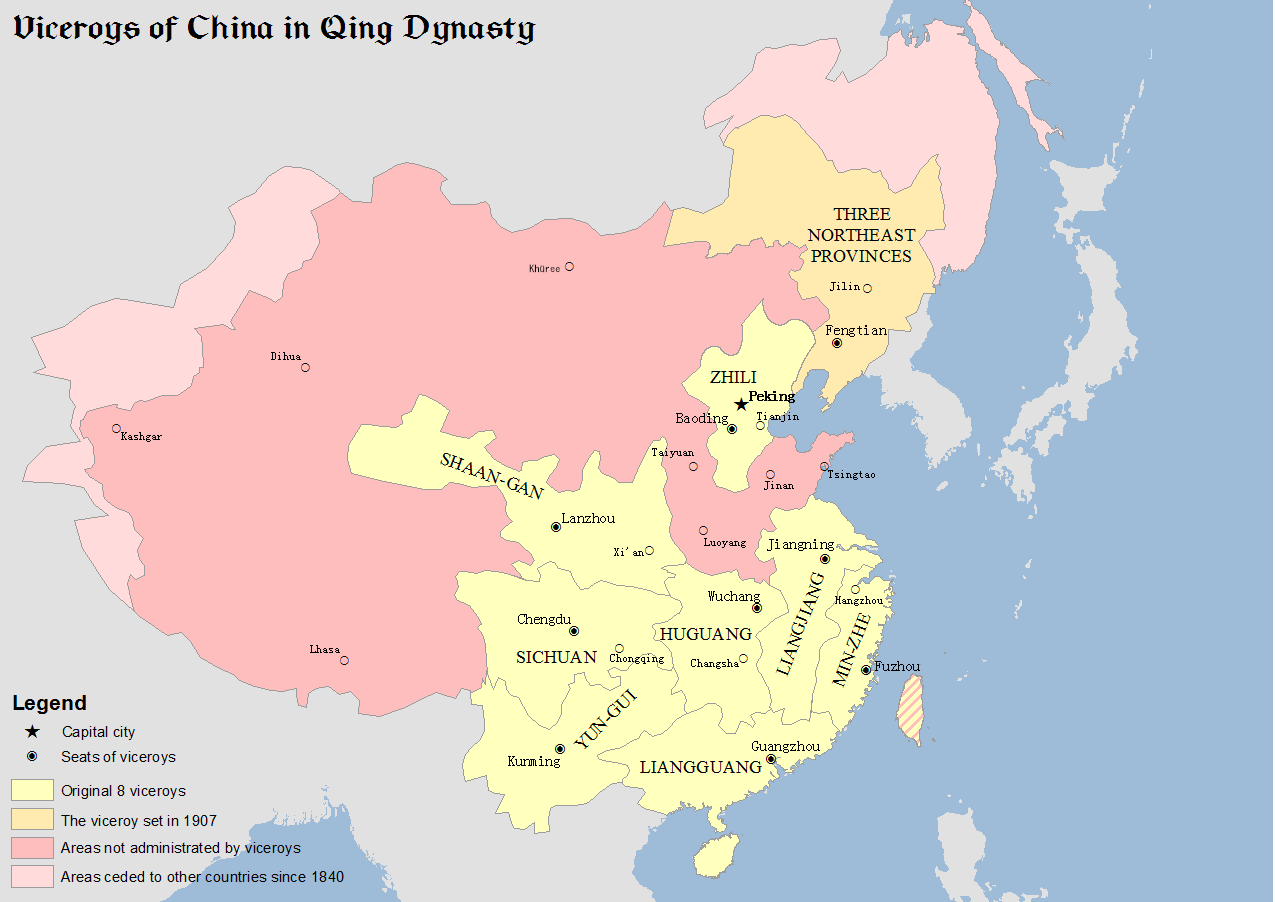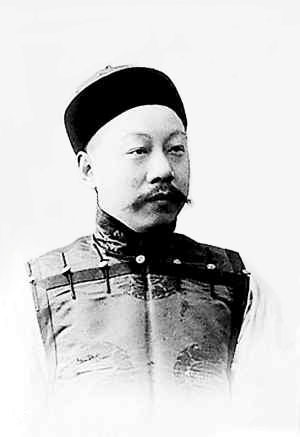|
Yuan Shih-kai
Yuan Shikai (; 16 September 1859 – 6 June 1916) was a Chinese military and government official who rose to power during the late Qing dynasty and eventually ended the Qing dynasty rule of China in 1912, later becoming the Emperor of China. He first tried to save the dynasty with a number of modernization projects including bureaucratic, fiscal, judicial, educational, and other reforms, despite playing a key part in the failure of the Hundred Days' Reform. He established the first modern army and a more efficient provincial government in North China during the last years of the Qing dynasty before forcing the abdication of the Xuantong Emperor, the last monarch of the Qing dynasty in 1912. Through negotiation, he became the first President of the Republic of China in 1912. This army and bureaucratic control were the foundation of his autocratic rule. In 1915 he attempted to restore the hereditary monarchy in China, with himself as the Hongxian Emperor (). His death in 1916 sh ... [...More Info...] [...Related Items...] OR: [Wikipedia] [Google] [Baidu] |
Yuan (surname)
Yuan ( 袁, ) is a Chinese surname ranked 37th in China by population in 2019. In Standard Chinese, the surname is transliterated Yuán (hanyu pinyin) or Yüen2" ( Wade-Giles). Other romanizations include Yeu (Shanghainese), Ion ( Chang-Du Gan), Yuen (Cantonese), Oan (Hokkien/Min Nan), Wang ( Teochew), Won ( Korean), and Viên ( Vietnamese). Pronunciation differs widely from region to region. According to tradition, the surname originated from a noble family of the ancient state of Chen, in what is now eastern Henan province. The written form of the character took its current standardised form around the 1st century. During the Han Dynasty, it was associated with the powerful Yuan clan of Ru'nan and later during Jin and Southern Dynasties, with the Yuan clan of Chen. Historically, the name has been fast growing amongst Han Chinese, and has also been taken up by various non-Chinese ethnic groups. The surname is now held by more than 6.5 million people worldwide, and makes u ... [...More Info...] [...Related Items...] OR: [Wikipedia] [Google] [Baidu] |
Grand Council (Qing Dynasty)
The Grand Council or ''Junji Chu'' (; Manchu: ''coohai nashūn i ba''; literally, "Office of Military Secrets"), officially the ''Banli Junji Shiwu Chu'' (; "Office for the Handling of Confidential Military Affairs"), was an important policy-making body of China during the Qing dynasty. It was established in 1733 by the Yongzheng Emperor. The council was originally in charge of military affairs, but gradually attained a more important role and eventually attained the role of a privy council, eclipsing the Grand Secretariat in function and importance, which is why it has become known as the "Grand Council" in English. Despite its important role in the government, the Grand Council remained an informal policy making body in the inner court and its members held other concurrent posts in the Qing civil service. Originally, most of the officials serving in the Grand Council were Manchus, but gradually Han Chinese officials were admitted into the ranks of the council. One of the earli ... [...More Info...] [...Related Items...] OR: [Wikipedia] [Google] [Baidu] |
Henan
Henan (; or ; ; alternatively Honan) is a landlocked province of China, in the central part of the country. Henan is often referred to as Zhongyuan or Zhongzhou (), which literally means "central plain" or "midland", although the name is also applied to the entirety of China proper. Henan is a birthplace of Han Chinese civilization, with over 3,200 years of recorded history and remained China's cultural, economic and political center until approximately 1,000 years ago. Henan Province is home to many heritage sites, including the ruins of Shang dynasty capital city Yin and the Shaolin Temple. Four of the Eight Great Ancient Capitals of China, Luoyang, Anyang, Kaifeng and Zhengzhou, are in Henan. The practice of tai chi also began here in Chen Jia Gou Village (Chen style), as did the later Yang and Wu styles. Although the name of the province () means "south of the ellowriver.", approximately a quarter of the province lies north of the Yellow River, also known as the H ... [...More Info...] [...Related Items...] OR: [Wikipedia] [Google] [Baidu] |
Xiangcheng City
Xiangcheng () is a county-level city in Zhoukou, Henan, People's Republic of China. It borders Shenqiu to the east, Shangcai to the west, Huaiyang to the north, Pingyu to the southeast, and the province of Anhui in the southeast. It has a population of . Xiangcheng is known to be the birthplace of the first president of the Republic of China, Yuan Shikai Yuan Shikai (; 16 September 1859 – 6 June 1916) was a Chinese military and government official who rose to power during the late Qing dynasty and eventually ended the Qing dynasty rule of China in 1912, later becoming the Emperor of China. H .... Administrative divisions As 2012, this city is divided to 6 subdistricts, 12 towns and 3 townships. ;Subdistricts ;Towns ;Townships * Yongfeng Township () * Fanji Township () * Sanzhang Township () Climate References External linksOfficial website of Xiangcheng City government Cities in Henan County-level divisions of Henan Zhoukou {{Henan-geo-stub ... [...More Info...] [...Related Items...] OR: [Wikipedia] [Google] [Baidu] |
Zhang Renjun
Zhang Renjun (; 1846–1927) courtesy name Qianli () was Viceroy of Liangguang from August 12, 1907, to June 28, 1909, and the last Viceroy of Liangjiang from June 28, 1909, until the overthrow of the Qing dynasty in the Xinhai Revolution The 1911 Revolution, also known as the Xinhai Revolution or Hsinhai Revolution, ended China's last imperial dynasty, the Manchu-led Qing dynasty, and led to the establishment of the Republic of China. The revolution was the culmination of a ... and the establishment of the Republic of China on January 23, 1912. {{DEFAULTSORT:Zhang, Renjun 1846 births 1927 deaths Qing dynasty politicians from Hebei Politicians from Tangshan Political office-holders in Jiangsu Assistant Grand Secretaries Viceroys of Liangguang Viceroys of Liangjiang ... [...More Info...] [...Related Items...] OR: [Wikipedia] [Google] [Baidu] |
Yuxian (Qing Dynasty)
Yuxian (1842–1901) was a Manchu high official of the Qing dynasty who played an important role in the violent anti-foreign and anti-Christian Boxer Rebellion, which unfolded in northern China from the fall of 1899 to 1901. He was a local official who rose quickly from prefect of Caozhou (in unruly southwestern Shandong) to judicial commissioner and eventually governor of Shandong province. Dismissed from that post because of foreign pressure, he was soon named governor of Shanxi province. At the height of the Boxer crisis, as Allied armies invaded China in July 1900, he invited a group of 45 Christians and American missionaries to the provincial capital, Taiyuan, saying he would protect them from the Boxers. Instead, they were all killed. Foreigners, blaming Yuxian for what they called the Taiyuan Massacre, labeled him the "Butcher of Shan-hsi hanxi. After Allied armies seized control of North China, Yuxian was blamed by both foreign and Chinese officials for having encou ... [...More Info...] [...Related Items...] OR: [Wikipedia] [Google] [Baidu] |
Shandong
Shandong ( , ; ; Chinese postal romanization, alternately romanized as Shantung) is a coastal Provinces of China, province of the China, People's Republic of China and is part of the East China region. Shandong has played a major role in History of China, Chinese history since the beginning of Chinese civilization along the lower reaches of the Yellow River. It has served as a pivotal cultural and religious center for Taoism, Chinese Buddhism and Confucianism. Shandong's Mount Tai is the most revered mountain of Taoism and a site with one of the longest histories of continuous religious worship in the world. The Buddhist temples in the mountains to the south of the provincial capital of Jinan were once among the foremost Buddhist sites in China. The city of Qufu is the birthplace of Confucius and was later established as the center of Confucianism. Confucianism developed from what was later called the Hundred Schools of Thought from the teachings of the Chinese philosopher Con ... [...More Info...] [...Related Items...] OR: [Wikipedia] [Google] [Baidu] |
Provincial Governor Of The Ming And Qing Dynasties
A ''xunfu'' was an important History of China#Imperial China, imperial Chinese provincial office under both the Ming dynasty, Ming (14th–17th centuries) and Qing dynasty, Qing (17th–20th centuries) dynasties. However, the purview of the office under the two dynasties differed markedly. Under the Ming dynasty, the post originated around 1430 as a kind of inspector-general and ad hoc provincial-level administrator; such a ''xunfu'' is usually translated as a . However, since the mid-17th century, ''xunfu'' became the title of a regular provincial governor overseeing civil administration in the Qing dynasty. Under both dynasties, the ''xunfu'' was subordinate in military affairs to the multi-provincial ''zongdu'' (wikt:總督, 總督), usually translated as "supreme commander" under the Ming and "governor-general" or "Viceroys in China, viceroy" under the Qing. Ming grand coordinator The "grand coordinator" of the Ming dynasty (1368–1644) was one of several institutional inn ... [...More Info...] [...Related Items...] OR: [Wikipedia] [Google] [Baidu] |
Yang Shixiang
Yang may refer to: * Yang, in yin and yang, one half of the two symbolic polarities in Chinese philosophy * Korean yang, former unit of currency of Korea from 1892 to 1902 * YANG, a data modeling language for the NETCONF network configuration protocol Geography * Yang County, in Shaanxi, China * Yangzhou (ancient China), also known as Yang Prefecture * Yang (state), ancient Chinese state * Yang, Iran, a village in Razavi Khorasan Province * Yang River (other) People * Yang, one of the names for the Karen people in the Thai language *Yang di-Pertuan Agong, the constitutional monarch of Malaysia * Yang (surname), Chinese surname * Yang (Korean surname) Fictional characters * Cristina Yang, on the TV show ''Grey's Anatomy'' * Yang, from the show ''Yin Yang Yo!'' * Yang, Experiment 502 in '' Lilo and Stitch: The Series'' * Yang Fang Leiden, from ''Final Fantasy IV'' * Yang Lee, in the ''Street Fighter III'' series of videogames * Mr. Yang, the Yin Yang serial killer ... [...More Info...] [...Related Items...] OR: [Wikipedia] [Google] [Baidu] |
Li Hongzhang
Li Hongzhang, Marquess Suyi ( zh, t=李鴻章; also Li Hung-chang; 15 February 1823 – 7 November 1901) was a Chinese politician, general and diplomat of the late Qing dynasty. He quelled several major rebellions and served in important positions in the Qing imperial court, including the Viceroy of Zhili, Huguang and Liangguang. Although he was best known in the West for his generally pro-modern stance and importance as a negotiator, Li antagonised the British with his support of Russia as a foil against Japanese expansionism in Manchuria and fell from favour with the Chinese after their defeat in the First Sino-Japanese War. His image in China remains controversial, with criticism on one hand for political and military defeats and praise on the other for his success against the Taiping Rebellion, his diplomatic skills defending Chinese interests in the era of unequal treaties, and his role pioneering China's industrial and military modernisation. He was presented the R ... [...More Info...] [...Related Items...] OR: [Wikipedia] [Google] [Baidu] |
Viceroy Of Zhili
The Viceroy of Zhili, fully referred to in Chinese as the Governor-General of Zhili and Surrounding Areas Overseeing Military Affairs and Food Production, Manager of Waterways, Director of Civil Affairs, was one of eight regional Viceroys during the Qing dynasty. The Viceroy of Zhili was an important post because the province of Zhili, which literally means "directly ruled", was the area surrounding the imperial capital, Beijing. The administrative centre was in Tianjin even though the provincial capital was in Baoding. The Viceroy's duties as well as responsibilities have never been defined entirely. Generally speaking, the Viceroy oversaw the military and civil affairs of Zhili, Shandong and Henan provinces. The Viceroy of Zhili was also highly influential in imperial court politics. History The office was first created on 30 September 1649 during the reign of the Shunzhi Emperor, but was later abolished on 1 June 1658. On 23 November 1661, during the reign of the Kangxi Emperor ... [...More Info...] [...Related Items...] OR: [Wikipedia] [Google] [Baidu] |
Liang Dunyan
Liang Dunyan (; 1857, Foshan, Guangdong, Qing Empire – May 10, 1924, Tianjin, Republic of China) was a Qing dynasty diplomat and politician. A graduate of Yale University, he served as the minister of foreign affairs in the first cabinet of China under Yikuang (Prince Qing) and later in the cabinet of Yuan Shikai. A monarchist, he supported the Manchu Restoration of July 1917 and was the foreign minister under Zhang Xun. Bibliography * * References 1857 births 1924 deaths Premiers of the Republic of China Qing dynasty diplomats Politicians from Foshan Qing dynasty politicians from Guangdong Republic of China politicians from Guangdong Yale University alumni Foreign Ministers of the Qing dynasty {{s-end ... [...More Info...] [...Related Items...] OR: [Wikipedia] [Google] [Baidu] |




